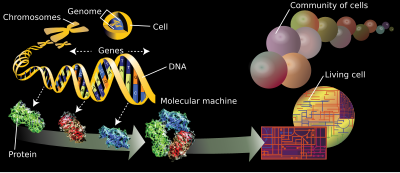You can help expand this article with text translated from the corresponding article in French. (May 2022) Click [show] for important translation instructions.
|

The branches of science known informally as omics are various disciplines in biology whose names end in the suffix -omics, such as genomics, proteomics, metabolomics, metagenomics, phenomics and transcriptomics. Omics aims at the collective characterization and quantification of pools of biological molecules that translate into the structure, function, and dynamics of an organism or organisms.[1]
The related suffix -ome is used to address the objects of study of such fields, such as the genome, proteome or metabolome respectively. The suffix -ome as used in molecular biology refers to a totality of some sort; it is an example of a "neo-suffix" formed by abstraction from various Greek terms in -ωμα, a sequence that does not form an identifiable suffix in Greek.
Functional genomics aims at identifying the functions of as many genes as possible of a given organism. It combines different -omics techniques such as transcriptomics and proteomics with saturated mutant collections.[2]
- ^ Subedi, Prabal; Moertl, Simone; Azimzadeh, Omid (2022). "Omics in Radiation Biology: Surprised but Not Disappointed". Radiation. 2: 124–129. doi:10.3390/radiation2010009.
- ^ Holtorf, Hauke; Guitton, Marie-Christine; Reski, Ralf (2002). "Plant functional genomics". Naturwissenschaften. 89 (6): 235–249. Bibcode:2002NW.....89..235H. doi:10.1007/s00114-002-0321-3. PMID 12146788. S2CID 7768096.